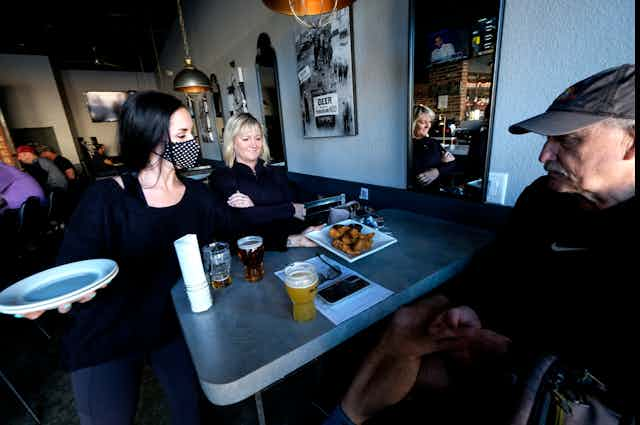The Research Brief is a short take about interesting academic work.
The big idea
Customers perceive a better quality of service, feel less anxious and exhibit more trust in businesses when waiters and other service workers wear a mask, according to a new study we just submitted for peer review. And we found this to be especially true when the mask was black.
We surveyed about 4,500 Americans through Amazon’s Mechanical Turk, showing each of them a random picture of a service employee, with or without a mask, in either a grocery store, bank, hair salon, hotel or restaurant. We included photos of men and women who were either Black, white or Asian. Further, the masks were in one of five color schemes: white, black, blue, multi-colored or clear.
We then asked participants to record their impressions of the service workers and subsequent perceptions, emotions and behavior.
We found that customers consistently expected higher quality of service from workers who wore masks compared to employees who weren’t wearing face coverings. We also found that participants tended to become less anxious when they saw a service person with a mask.
Interestingly, we found that the color of the mask worn made a difference. People who wore black masks got the highest ratings, followed by white, multi-colored and blue. The clear mask – even though it allows customers to actually see facial expressions – was rated the lowest by respondents.
While we didn’t ask participants about their political leanings, we did learn where they reside. And we found that those based in the West had the most positive reaction to mask-wearing, followed, in order, by people in the Southwest, Northeast, Southeast and Midwest.
We found no meaningful differences in terms of the respondents’ age, race or educational level.

Why it matters
President Joe Biden’s first acts as president included requiring masks be worn on all federal property and on planes and trains, and most businesses already expect their employees to wear face coverings while working. While the primary reason for this is to mitigate the spread of the coronavirus and protect workers, little is known about how mask-wearing can affect customer perceptions of service quality.
Wearing a mask in Asian cultures has been a socially accepted practice for years. In the United States, however, wearing a mask became common only last year as the pandemic worsened in the spring. The practice remains controversial among some people who claim it violates their civil liberties or isn’t actually effective, though health officials have consistently endorsed their use.
Although there have been many reports of altercations when workers asked a customer to wear a mask, our research shows most people appreciate it when waiters and hairdressers cover their own faces.
What’s next
We plan to also study other effects of wearing masks. For example, are the perceptions of service staff members affected when customers and fellow employees wear a mask or not? What’s the impact on a customer if a mask carries a logo of a company or branding message? Do servers who wear masks receive higher tips?
[You’re smart and curious about the world. So are The Conversation’s authors and editors. You can read us daily by subscribing to our newsletter.]

